Kosovo Kids
Kosovo Kids was a special project undertaken by German reportage photographer Erol Gurian and myself in February 2000. The purpose of the project was to document in a small way the situation following the arrival of the KFOR peace-keeping force. We were fascinated by the extraordinary resilience of the children of the region, and wanted to use them as a mouthpiece for the situation.



INTRODUCTION
War changes everyone it touches. It brings uncertainty, chaos, and strips children of their innocence.
Walk through the old town of Djakova and the destruction is astonishing. Where there were quaint market shops with tiled roofs, there's rubble. Not a single building is left standing. The physical carnage of Kosovo is everywhere.
But the Kosovo Kids Project was concerned with another form of destruction - the chaos wrought on a child's innocence. Unlike the damaged buildings, such injuries are invisible to the eye.
We sat down informally with many groups of children across Kosovo. We chatted with them, played games, and got to know them. Sometimes we were in classrooms in towns, at other times in villages, or in makeshift refugee camps.
When the children were at ease, we showed them photographs. The images were a chronicle of life in Kosovo during the previous twelve months. There were pictures of destruction, protests, and funerals. But others were more uplifting - children playing, the KFOR presence, and rebuilding.
We asked the children to talk about the pictures - to comment on details, or say what the images reminded them of. There was no rigid framework. We wanted the responses to be as natural and informal as possible.
It was clear from the outset that the children had been exposed to every kind of disturbing sight and experience. Many had stories to tell. Some were sad, others upbeat and made us laugh. We were struck by the remarkable eloquence of many children.
We left Kosovo enriched by the strength of the children we had met. The security of their childhood might have been shattered, but their extraordinary resilience touched both Erol and I.
The children of today will inherit the Kosovo of tomorrow.
THE INTERVIEWS
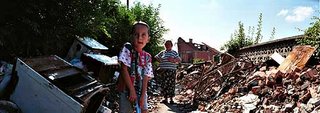
1: Boy with Gun | Besnik, 13
The boy wants to join the UCK and to kill the Serbs for destroying his home. The picture makes me feel the same anger that the boy feels. My home looks like his. Destruction like this can make even a child angry. But the boy is too young to fight. His gun is a toy. I can see it's a toy because the real one is too heavy for him to hold like that, and it has a different handle, where the magazine goes in. The mother looks frightened. She is tired of the killing, and doesn't want her young son to die. She wants the guns to be destroyed, like my mother wants. I think there's still a need for guns, to protect ourselves. The rebels come and kill Albanians in Kosovo. If we don't kill them, they will kill us. But my mother says it's time to throw guns away, and to take up books and pens instead.
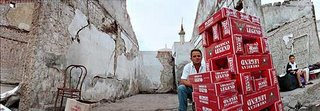
2: Cigarette Seller | Basm, 11
Since the fighting there are cigarette sellers everywhere. They sit by tall piles of cartons, usually selling Albanian brands. They have families, but their homes have been burned down. I always look at their faces. When they are together, they laugh and talk about the times before the war. But when they are alone, you see sadness in their eyes. They are worried about the future, about feeding their wives and children.
My father always tells me to respect these men. They are proud, he tells me. They have honour, and are doing what they can to bring bread home. My uncle sells cigarettes like these ones, American Legend. They are made in Albania. He stands in the old part of Djakova. Sometimes I go and stand with him. I help him make the display of cartons. He tells me stories and says that the future will be good, but only if I work hard and am an honest person. The future of Kosovo belongs to honest people, he says, and not to liars. My uncle is very kind. But his eyes are sad.

3: Hero's graveyard | Besnik, 14
This man is a hero. He was a brave, strong fighter, a member of the UCK. His family miss him. But they are very proud. My brother is a hero like this man. He was killed last February. We go and sit by his grave and talk about him. My father says he has gone to heaven, and that I must always remember his bravery. I think of him all the time. He was very kind, and used to carry me on his shoulders. He said to me that he would protect us and would keep fighting until Kosovo was free. One night before he died, I walked with him across the fields. We were alone. He said that if he died, I would have to carry on the war, the war for freedom. I told him that I would do that.
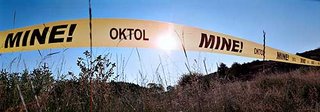
4: Land Mine sign | Dusan, 13
I remember last Spring when the snow had melted, I went with my friends to the end of the village where we lived. We saw rabbits, and little white flowers. I was so happy that the winter was over. My friends and me were so excited, because we had spent weeks inside the houses. It was too dangerous to go into the fields then. Even when the Serbs had left our village, my mother said I shouldn't play in the fields. She said they may have left bombs there. We played in a farm near to the village. The farm buildings were burned, and had no roofs. In the fields there was a crop of corn, which had not been picked. My best friend picked a piece of the corn and threw it at me. I was going to pick a piece and throw it at him. I went to a corn plant and was going to grab the piece. But my friend shouted at me. 'Stop!' he shouted. 'That's not corn… it's a bomb!' The soldiers had left a hand grenade there, pretending it was a piece of corn.

5: UCK House Destroyed | Basm, 13 | Frame 32/33
So many houses have been destroyed with fire and bullets and bombs. But this one is different from the others. This is the most important house in Kosovo. It was here that Adem Jashari began the fight against the Serbs. He was the bravest man ever to live. He was a true hero. The Serbs surrounded the house with tanks and attacked. Through days and nights they fought, until Jashari and his entire family were dead. In the cemetery near the house the graves are fresh. But the bravery of those who died will live always in our hearts.
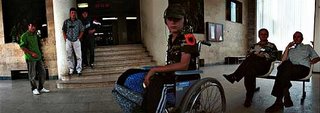
6: Boy in Wheelchair | Fazli, 13
He wears the name of the UCK on his shoulder. He is too young to be a fighter, but in his heart he wants to kill every Serb. He is brave. I think he's braver than the other men, the ones sitting and the others standing. He may be in a wheelchair, but it is the bravery of people like him which has made Kosovo free. You can tell it was a mine which has done this. As well as the explosion, there's shrapnel. That's how his hand was wounded, and his leg was blown off. The Serbs laid thousands of mines, which kill children who are playing in the forest. And they wound young men who are trying to rebuild Kosovo. Once I saw a farmer digging something in a field. I thought he was digging up the root of a tree. But he took a mine out of the ground. He gave it to the KFOR soldiers, and they destroyed it.

7: Protest | Vlora, 14
Every Friday there is a protest like this in Djakova. Mothers carry the pictures of their husbands. Girls carry the pictures of their brothers. They walk through the town, and call out the names of the missing. They want NATO to help to get the men back. The girls in the picture are thinking about their brothers and their fathers who are missing. They are angry and frightened. Many men were taken to Serbia where they are in prison. Some of them are being tortured. At this moment they are lying in prisons, being beaten, being tortured.
No, NATO mustn't bomb the Serbs again. If they do, the prisoners will be killed.
When they have walked through Djakova, the protesters stand in the centre of the town and talk about their missing relatives and friends. They tell stories about them, and they cry for them. They will not forget them, or stop protesting until they have all come home.

8: Doctor's Surgery | Bardh, 10
We were playing in the street when the NATO jet bombed the police station here in Djakova. Pieces of shrapnel sprayed out. Luckily, I wasn't hit, but my friend was hit in the face. The doctors worked for hours to save his eyes.
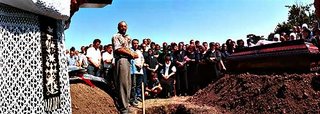
9: Burial | Landrit, 14
Two days after NATO started bombing, the Serbs came to the village. They were swearing, and shouting 'You asked for Clinton, well where's Clinton to help you now?!' They attacked every house in the village. They looted the valuable things and demanded money. If people didn't hand over money, the Serbs killed their children. My uncle was taken along with other men. We were forced to leave the village. We tried to go to Albania, but they wouldn't let us cross the border. So we went back to the village and stayed in the stables. Three months later I saw something in a ditch outside the village. It was a body. I recognised from the clothing that it was my uncle. There was water in the ditch, and just bones were left. My uncle was very popular. When his body was buried there was a big funeral. So many people came, even people who had not known him.
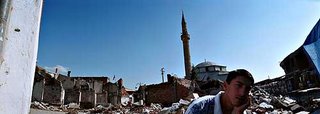
10: Bombed Mosque | Anwar, 15
The mosque is a symbol of our religion. By bombing the mosque you do not destroy our religion, but you dishonour what is sacred to us. The Serbs bombed the mosques because they knew that there were people hiding inside them. Did they think that by smashing down our sacred buildings they could defeat us?

11: X-ray | Osman, 10 | Frame 16/17
We fled from our village and ran into the hills. But when the Serb police found us, they forced us to return to our village. They said they'd kill us if we did not go back. Soon after that some Serb soldiers came and forced us to leave for another village. While we were on the road NATO bombed, and I was hit in the face by little pieces of metal. My mother and two sisters were killed. My father carried me for three days. He looked for a doctor, someone to take the shrapnel out of my head. I cannot remember much of that time.
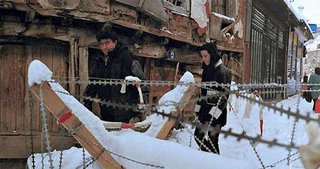
12: Christian Church being defended | Liliana, 15 (Serb)
It's a beautiful old church. But the Albanians want to destroy it. They want to burn it down. That's why KFOR are guarding it with soldiers and barbed wire. The Albanians hate anything that's Serbian.
My best friend was Albanian before the fighting. Her name was Saranda. We used to ride our bicycles together and play with our dolls. Sometimes she slept over at my house, and sometimes I stayed with her family. We told each other all our secrets. After the war I saw her in the street and ran over to her. But she pretended not to know me. She said I must have mistaken her for someone else. I know it was her. She was wearing the earrings I'd given her. It made me very upset that she wouldn't still be friends. I know she's not thinking of me now. She has forgotten me, but I still think about her and our friendship.
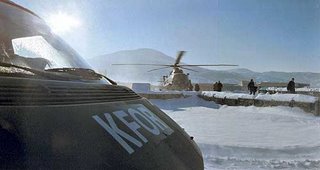
13: KFOR truck and chopper | Dimitri, 12 (Serb)
KFOR are everywhere. When they came we thought they would kill us. All of them had guns, big guns. My mother and father were very frightened. They told me and my sisters to hide under the stairs, because the NATO soldiers were angry. We waited for them to come to our house and shoot us dead. But they did not come. The soldiers gave me and my friends sweets, but my mother told me not to eat them. She said that I must not trust anyone from KFOR, as they are friends of the Albanians, and enemies of the Serbs. The sweets were from America. I had not had sweets from America before. But I did what my mother said, and I threw those sweets away.
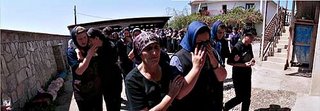
14: Christian women going to a funeral | Milena, 13
In the photograph I see sad faces, people who have lost a brother, a father, a son. When I look at the picture, I feel sad, too. Because I know what has happened to these people. I know what they have seen. It makes me remember the cool, silent morning when the tanks came to our village. My little brother saw them first. He called from the top of the hill 'They are coming! They are coming!' I looked out of the window and saw a line of dark green tanks coming down the narrow road. They stopped just outside the village. Many men climbed out of the tanks. Their faces were covered in masks. My father locked the door of our house and told us to run to the basement. He told us to stay quiet like mice, and the soldiers would leave us alone. Down in the basement we heard screaming, and shooting from guns. My mother was crying. When we came up from the basement the village was burning. There were bodies, so many bodies. One of them was my father's.
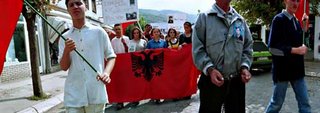
15: Protesters | Sophia, 13
Look at the photographs. Look at the faces of the peoples in them. Every face is a person, a person who is in prison in Serbia. For every face there is a family worrying. For every face there is a mother, sisters, brothers who do not know when they will be reunited with the person they love. They have not forgotten him. They will not forget or give up hope until he comes home. was bandaged like the boy in the picture. His mother cried all the time. The Serb soldiers were very angry when the police station was bombed. They killed people just because they were angry. My mother told me to go inside the house and to stay in the basement. She said I would be killed if I went into the street again. After a long time I got bored in the basement. I climbed out a window and went out with my wheelbarrow to help people move their belongings. My mother was sleeping. When a Serb policeman saw me pushing my wheelbarrow, he pointed his gun and shot at me. I quickly fell down and pulled the wheelbarrow over me. It protected me from the bullets. When the Serbs had gone, I ran home. I promised my mother that I'd stay in the basement after that.
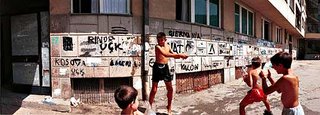
16: Graffiti | Sonia, 14
There is graffiti on the walls. The words written remind us of the pain. The children are playing in the summer sunshine, but they have tasted sadness which will never leave them. Every child in Kosovo has felt pain. On the outside they are hard, like the shell of a nut, but inside they are still children.
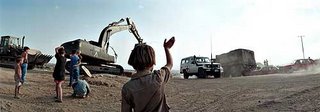
17: Diggers Rebuilding | Natasha, 15
During the war we lived from one day to the next, from one moment to the next. We could not think about the future. To think of what will come is a luxury, one that we could not afford. But now that the UCK and NATO have driven away the Serbs, we can think about the months and the years which lie ahead. We can plan, rebuild the schools, the farms and houses. But, best of all, we can rebuild a Kosovo without the Serbs.
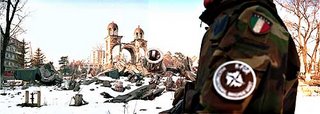
18: Destroyed Serb Church | 13, (Serb)
My family has always lived in Djakova, and we would always go to pray in the church. When we sang hymns our voices rose higher and higher, and echoed out across Djakova. The terrorists want us dead, all of us. They destroyed the church and laughed as it burned. My mother says that the Albanians are the Devil and they will not stop until every Serb is buried in the ground. I wish life could be as it was before the war, but I know that those times have gone. Just as our church has one.
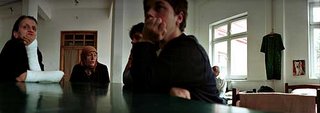
19: Injured woman | Liliana, 14 (Serb)
This is a Serb woman who has been hurt by the Albanians. They tried to kill her. Look at her arms; look at the anger she has in her eyes. She was doing nothing to harm anyone, and they did this to her. The people at the table are like us, they are ordinary people. They are frightened people. They do not know what the future could be; and they are worried what will happen when KFOR leaves. The Albanians will come and kill us, just like they tried to kill this woman. They will not stop until each one of us is dead.

20: White Container Home | Hannah, 14
In our home we had a set of fine china which my mother kept for when guests came. It was green and white with little flowers painted around the rim of the cups. We had a set of old glasses too, which had belonged to my grandmother. When we escaped to Albania we had to leave all of it behind. My father said that such possessions did not matter, only our lives were important. But I know that my mother still thinks of the china and the glasses when she is lying in bed at night.

21: Returned to Village | Mimoza, 14
They have come back to the village and have found that their houses have been burned by the Serbs. Of course they are sad to have lost relatives and friends. And, their possessions have been stolen or burned. But they are hopeful. The future belongs to them. They know that life will be hard, but by the time the baby has grown into a man, Kosovo will be rich again. And it will always be free. The baby is their hope.
When we had to escape into the mountains during the war, we stayed in a village like this one. The people had very little food, but they shared it with us. They told us that their village was our home. They were very hospitable. I made friends with a girl there, called Nita. We played and drew pictures of many things. I was sad inside because my father was missing. Nita told me not to worry. She said he would come home. When we left the village and went back to the town, my father was waiting for us. Nita was right.
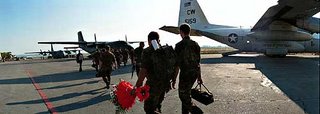
22: NATO Soldiers Leaving | Amina, 14 | Frame 26/27
When the KFOR soldiers leave Kosovo I hope they will have good memories of our country. It is an honourable thing to help a person who you do not know. They are brave men. I won't forget the way they greeted us when they first arrived. We were all frightened when we first saw KFOR tanks coming towards our village. My parents told my sisters and me to hide in the cellar. But instead of shooting us, the soldiers threw us sweets. These soldiers are going home because their families will be missing them. When they get home their mothers and wives with thank God for bringing them home alive; just as we thank God for sending them to us.

23: Man and ruins | Ivana, 11
Everything is broken down in the picture and the man is sad. Maybe he is angry, too. He is wondering how such a beautiful place became so smashed and ugly. My village was so beautiful, like this place used to be. We had many old buildings, fields, and trees. We used to play hide-and-seek. My friend and me used to pretend we were princesses. We dressed our dolls up like princesses, too. I lost my dolls when the house was burned down in the war. I lost my brother as well. He was killed in an ambush. He was fighting with the UCK. I am very proud of him. Yes, I miss him. I think of him in my dreams. When I dream, I think of the time before the war… when we played in the fields, when my brother was alive.



INTRODUCTION
War changes everyone it touches. It brings uncertainty, chaos, and strips children of their innocence.
Walk through the old town of Djakova and the destruction is astonishing. Where there were quaint market shops with tiled roofs, there's rubble. Not a single building is left standing. The physical carnage of Kosovo is everywhere.
But the Kosovo Kids Project was concerned with another form of destruction - the chaos wrought on a child's innocence. Unlike the damaged buildings, such injuries are invisible to the eye.
We sat down informally with many groups of children across Kosovo. We chatted with them, played games, and got to know them. Sometimes we were in classrooms in towns, at other times in villages, or in makeshift refugee camps.
When the children were at ease, we showed them photographs. The images were a chronicle of life in Kosovo during the previous twelve months. There were pictures of destruction, protests, and funerals. But others were more uplifting - children playing, the KFOR presence, and rebuilding.
We asked the children to talk about the pictures - to comment on details, or say what the images reminded them of. There was no rigid framework. We wanted the responses to be as natural and informal as possible.
It was clear from the outset that the children had been exposed to every kind of disturbing sight and experience. Many had stories to tell. Some were sad, others upbeat and made us laugh. We were struck by the remarkable eloquence of many children.
We left Kosovo enriched by the strength of the children we had met. The security of their childhood might have been shattered, but their extraordinary resilience touched both Erol and I.
The children of today will inherit the Kosovo of tomorrow.
THE INTERVIEWS

1: Boy with Gun | Besnik, 13
The boy wants to join the UCK and to kill the Serbs for destroying his home. The picture makes me feel the same anger that the boy feels. My home looks like his. Destruction like this can make even a child angry. But the boy is too young to fight. His gun is a toy. I can see it's a toy because the real one is too heavy for him to hold like that, and it has a different handle, where the magazine goes in. The mother looks frightened. She is tired of the killing, and doesn't want her young son to die. She wants the guns to be destroyed, like my mother wants. I think there's still a need for guns, to protect ourselves. The rebels come and kill Albanians in Kosovo. If we don't kill them, they will kill us. But my mother says it's time to throw guns away, and to take up books and pens instead.

2: Cigarette Seller | Basm, 11
Since the fighting there are cigarette sellers everywhere. They sit by tall piles of cartons, usually selling Albanian brands. They have families, but their homes have been burned down. I always look at their faces. When they are together, they laugh and talk about the times before the war. But when they are alone, you see sadness in their eyes. They are worried about the future, about feeding their wives and children.
My father always tells me to respect these men. They are proud, he tells me. They have honour, and are doing what they can to bring bread home. My uncle sells cigarettes like these ones, American Legend. They are made in Albania. He stands in the old part of Djakova. Sometimes I go and stand with him. I help him make the display of cartons. He tells me stories and says that the future will be good, but only if I work hard and am an honest person. The future of Kosovo belongs to honest people, he says, and not to liars. My uncle is very kind. But his eyes are sad.

3: Hero's graveyard | Besnik, 14
This man is a hero. He was a brave, strong fighter, a member of the UCK. His family miss him. But they are very proud. My brother is a hero like this man. He was killed last February. We go and sit by his grave and talk about him. My father says he has gone to heaven, and that I must always remember his bravery. I think of him all the time. He was very kind, and used to carry me on his shoulders. He said to me that he would protect us and would keep fighting until Kosovo was free. One night before he died, I walked with him across the fields. We were alone. He said that if he died, I would have to carry on the war, the war for freedom. I told him that I would do that.

4: Land Mine sign | Dusan, 13
I remember last Spring when the snow had melted, I went with my friends to the end of the village where we lived. We saw rabbits, and little white flowers. I was so happy that the winter was over. My friends and me were so excited, because we had spent weeks inside the houses. It was too dangerous to go into the fields then. Even when the Serbs had left our village, my mother said I shouldn't play in the fields. She said they may have left bombs there. We played in a farm near to the village. The farm buildings were burned, and had no roofs. In the fields there was a crop of corn, which had not been picked. My best friend picked a piece of the corn and threw it at me. I was going to pick a piece and throw it at him. I went to a corn plant and was going to grab the piece. But my friend shouted at me. 'Stop!' he shouted. 'That's not corn… it's a bomb!' The soldiers had left a hand grenade there, pretending it was a piece of corn.

5: UCK House Destroyed | Basm, 13 | Frame 32/33
So many houses have been destroyed with fire and bullets and bombs. But this one is different from the others. This is the most important house in Kosovo. It was here that Adem Jashari began the fight against the Serbs. He was the bravest man ever to live. He was a true hero. The Serbs surrounded the house with tanks and attacked. Through days and nights they fought, until Jashari and his entire family were dead. In the cemetery near the house the graves are fresh. But the bravery of those who died will live always in our hearts.

6: Boy in Wheelchair | Fazli, 13
He wears the name of the UCK on his shoulder. He is too young to be a fighter, but in his heart he wants to kill every Serb. He is brave. I think he's braver than the other men, the ones sitting and the others standing. He may be in a wheelchair, but it is the bravery of people like him which has made Kosovo free. You can tell it was a mine which has done this. As well as the explosion, there's shrapnel. That's how his hand was wounded, and his leg was blown off. The Serbs laid thousands of mines, which kill children who are playing in the forest. And they wound young men who are trying to rebuild Kosovo. Once I saw a farmer digging something in a field. I thought he was digging up the root of a tree. But he took a mine out of the ground. He gave it to the KFOR soldiers, and they destroyed it.

7: Protest | Vlora, 14
Every Friday there is a protest like this in Djakova. Mothers carry the pictures of their husbands. Girls carry the pictures of their brothers. They walk through the town, and call out the names of the missing. They want NATO to help to get the men back. The girls in the picture are thinking about their brothers and their fathers who are missing. They are angry and frightened. Many men were taken to Serbia where they are in prison. Some of them are being tortured. At this moment they are lying in prisons, being beaten, being tortured.
No, NATO mustn't bomb the Serbs again. If they do, the prisoners will be killed.
When they have walked through Djakova, the protesters stand in the centre of the town and talk about their missing relatives and friends. They tell stories about them, and they cry for them. They will not forget them, or stop protesting until they have all come home.

8: Doctor's Surgery | Bardh, 10
We were playing in the street when the NATO jet bombed the police station here in Djakova. Pieces of shrapnel sprayed out. Luckily, I wasn't hit, but my friend was hit in the face. The doctors worked for hours to save his eyes.

9: Burial | Landrit, 14
Two days after NATO started bombing, the Serbs came to the village. They were swearing, and shouting 'You asked for Clinton, well where's Clinton to help you now?!' They attacked every house in the village. They looted the valuable things and demanded money. If people didn't hand over money, the Serbs killed their children. My uncle was taken along with other men. We were forced to leave the village. We tried to go to Albania, but they wouldn't let us cross the border. So we went back to the village and stayed in the stables. Three months later I saw something in a ditch outside the village. It was a body. I recognised from the clothing that it was my uncle. There was water in the ditch, and just bones were left. My uncle was very popular. When his body was buried there was a big funeral. So many people came, even people who had not known him.

10: Bombed Mosque | Anwar, 15
The mosque is a symbol of our religion. By bombing the mosque you do not destroy our religion, but you dishonour what is sacred to us. The Serbs bombed the mosques because they knew that there were people hiding inside them. Did they think that by smashing down our sacred buildings they could defeat us?

11: X-ray | Osman, 10 | Frame 16/17
We fled from our village and ran into the hills. But when the Serb police found us, they forced us to return to our village. They said they'd kill us if we did not go back. Soon after that some Serb soldiers came and forced us to leave for another village. While we were on the road NATO bombed, and I was hit in the face by little pieces of metal. My mother and two sisters were killed. My father carried me for three days. He looked for a doctor, someone to take the shrapnel out of my head. I cannot remember much of that time.

12: Christian Church being defended | Liliana, 15 (Serb)
It's a beautiful old church. But the Albanians want to destroy it. They want to burn it down. That's why KFOR are guarding it with soldiers and barbed wire. The Albanians hate anything that's Serbian.
My best friend was Albanian before the fighting. Her name was Saranda. We used to ride our bicycles together and play with our dolls. Sometimes she slept over at my house, and sometimes I stayed with her family. We told each other all our secrets. After the war I saw her in the street and ran over to her. But she pretended not to know me. She said I must have mistaken her for someone else. I know it was her. She was wearing the earrings I'd given her. It made me very upset that she wouldn't still be friends. I know she's not thinking of me now. She has forgotten me, but I still think about her and our friendship.

13: KFOR truck and chopper | Dimitri, 12 (Serb)
KFOR are everywhere. When they came we thought they would kill us. All of them had guns, big guns. My mother and father were very frightened. They told me and my sisters to hide under the stairs, because the NATO soldiers were angry. We waited for them to come to our house and shoot us dead. But they did not come. The soldiers gave me and my friends sweets, but my mother told me not to eat them. She said that I must not trust anyone from KFOR, as they are friends of the Albanians, and enemies of the Serbs. The sweets were from America. I had not had sweets from America before. But I did what my mother said, and I threw those sweets away.

14: Christian women going to a funeral | Milena, 13
In the photograph I see sad faces, people who have lost a brother, a father, a son. When I look at the picture, I feel sad, too. Because I know what has happened to these people. I know what they have seen. It makes me remember the cool, silent morning when the tanks came to our village. My little brother saw them first. He called from the top of the hill 'They are coming! They are coming!' I looked out of the window and saw a line of dark green tanks coming down the narrow road. They stopped just outside the village. Many men climbed out of the tanks. Their faces were covered in masks. My father locked the door of our house and told us to run to the basement. He told us to stay quiet like mice, and the soldiers would leave us alone. Down in the basement we heard screaming, and shooting from guns. My mother was crying. When we came up from the basement the village was burning. There were bodies, so many bodies. One of them was my father's.

15: Protesters | Sophia, 13
Look at the photographs. Look at the faces of the peoples in them. Every face is a person, a person who is in prison in Serbia. For every face there is a family worrying. For every face there is a mother, sisters, brothers who do not know when they will be reunited with the person they love. They have not forgotten him. They will not forget or give up hope until he comes home. was bandaged like the boy in the picture. His mother cried all the time. The Serb soldiers were very angry when the police station was bombed. They killed people just because they were angry. My mother told me to go inside the house and to stay in the basement. She said I would be killed if I went into the street again. After a long time I got bored in the basement. I climbed out a window and went out with my wheelbarrow to help people move their belongings. My mother was sleeping. When a Serb policeman saw me pushing my wheelbarrow, he pointed his gun and shot at me. I quickly fell down and pulled the wheelbarrow over me. It protected me from the bullets. When the Serbs had gone, I ran home. I promised my mother that I'd stay in the basement after that.

16: Graffiti | Sonia, 14
There is graffiti on the walls. The words written remind us of the pain. The children are playing in the summer sunshine, but they have tasted sadness which will never leave them. Every child in Kosovo has felt pain. On the outside they are hard, like the shell of a nut, but inside they are still children.

17: Diggers Rebuilding | Natasha, 15
During the war we lived from one day to the next, from one moment to the next. We could not think about the future. To think of what will come is a luxury, one that we could not afford. But now that the UCK and NATO have driven away the Serbs, we can think about the months and the years which lie ahead. We can plan, rebuild the schools, the farms and houses. But, best of all, we can rebuild a Kosovo without the Serbs.

18: Destroyed Serb Church | 13, (Serb)
My family has always lived in Djakova, and we would always go to pray in the church. When we sang hymns our voices rose higher and higher, and echoed out across Djakova. The terrorists want us dead, all of us. They destroyed the church and laughed as it burned. My mother says that the Albanians are the Devil and they will not stop until every Serb is buried in the ground. I wish life could be as it was before the war, but I know that those times have gone. Just as our church has one.

19: Injured woman | Liliana, 14 (Serb)
This is a Serb woman who has been hurt by the Albanians. They tried to kill her. Look at her arms; look at the anger she has in her eyes. She was doing nothing to harm anyone, and they did this to her. The people at the table are like us, they are ordinary people. They are frightened people. They do not know what the future could be; and they are worried what will happen when KFOR leaves. The Albanians will come and kill us, just like they tried to kill this woman. They will not stop until each one of us is dead.

20: White Container Home | Hannah, 14
In our home we had a set of fine china which my mother kept for when guests came. It was green and white with little flowers painted around the rim of the cups. We had a set of old glasses too, which had belonged to my grandmother. When we escaped to Albania we had to leave all of it behind. My father said that such possessions did not matter, only our lives were important. But I know that my mother still thinks of the china and the glasses when she is lying in bed at night.

21: Returned to Village | Mimoza, 14
They have come back to the village and have found that their houses have been burned by the Serbs. Of course they are sad to have lost relatives and friends. And, their possessions have been stolen or burned. But they are hopeful. The future belongs to them. They know that life will be hard, but by the time the baby has grown into a man, Kosovo will be rich again. And it will always be free. The baby is their hope.
When we had to escape into the mountains during the war, we stayed in a village like this one. The people had very little food, but they shared it with us. They told us that their village was our home. They were very hospitable. I made friends with a girl there, called Nita. We played and drew pictures of many things. I was sad inside because my father was missing. Nita told me not to worry. She said he would come home. When we left the village and went back to the town, my father was waiting for us. Nita was right.

22: NATO Soldiers Leaving | Amina, 14 | Frame 26/27
When the KFOR soldiers leave Kosovo I hope they will have good memories of our country. It is an honourable thing to help a person who you do not know. They are brave men. I won't forget the way they greeted us when they first arrived. We were all frightened when we first saw KFOR tanks coming towards our village. My parents told my sisters and me to hide in the cellar. But instead of shooting us, the soldiers threw us sweets. These soldiers are going home because their families will be missing them. When they get home their mothers and wives with thank God for bringing them home alive; just as we thank God for sending them to us.

23: Man and ruins | Ivana, 11
Everything is broken down in the picture and the man is sad. Maybe he is angry, too. He is wondering how such a beautiful place became so smashed and ugly. My village was so beautiful, like this place used to be. We had many old buildings, fields, and trees. We used to play hide-and-seek. My friend and me used to pretend we were princesses. We dressed our dolls up like princesses, too. I lost my dolls when the house was burned down in the war. I lost my brother as well. He was killed in an ambush. He was fighting with the UCK. I am very proud of him. Yes, I miss him. I think of him in my dreams. When I dream, I think of the time before the war… when we played in the fields, when my brother was alive.